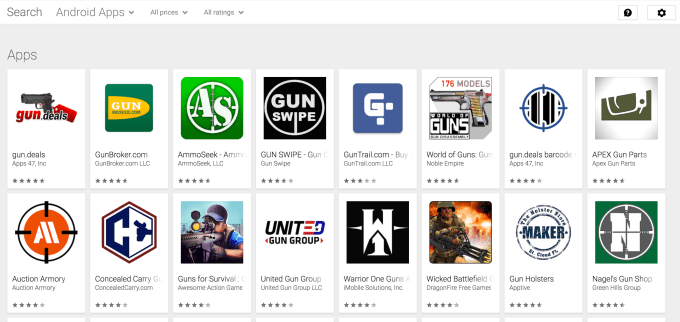
Google is cracking down on the apps published to the Play Store. An updated version of the company’s Developer Policy, released this week, indicates the company will now ban a wider variety of apps including cryptocurrency miners, those selling firearms and accessories, those that aim to trick children into downloading adult-themed apps, and apps built using automated tools or wizard services, or based on templates.
The latter move is especially interesting, as Apple did something similar last December that resulted in developer backlash, controversy, and even a U.S. Congressman reaching out to Apple to clarify its intent and reconsider its policy.
While it’s true that apps made with templates and wizards lead to spam apps and App Store clutter, several developers felt Apple, with its blanket ban, was wiping out small businesses from being able to participate in the App Store. The issue at hand was the fact that many smaller businesses, nonprofits and other organizations used an app templating service to create their own app. For example, templates and wizards were often used by local restaurants, schools, churches, clubs, and other small businesses that couldn’t invest in the design and development of their own apps.
As a result of the backlash, Apple revised its policy so it only impacted developers attempting to spam the App Store with multiple copies of a certain type of app. Instead of banning all templated apps, Apple’s new policy said that apps built using templates would be allowed if they were submitted by the provider of the app’s content. That is, if the local pizza place wanted its own app, it could submit its templated-built app itself.
Google clearly made a point not to make the same mistake with its own policy changes.
Its new policy clarifies the ban effects only:
Apps that are created by an automated tool, wizard service, or based on templates and submitted to Google Play by the operator of that service on behalf of other persons are not allowed. Such apps are only permissible if they are published by an individually registered developer account belonging to the user of the automated tool, not the operator of the service.
This more careful wording ensures that the policy will only address the problems with app store spam, and not with small business customers, or the app development services they use.
Another Google Play policy change bans apps that mine cryptocurrency on devices – something that could make it easier for Google Play to directly kick out apps that market themselves as something else, then mine on the sly without user’s consent. This follows a Google’s ban of mining apps from the Chrome Store this spring, due to a number of sketchy extensions that were misleading users.
Meanwhile, Google takes an almost moral position with the addition of a ban of apps that ” facilitate the sale of explosives, firearms, ammunition, or certain firearms accessories.” Specifically, Google calls out apps that sell accessories used to simulate automatic fire or convert firearms to automatic fire. This includes bump stocks, gatling triggers, drop-in auto sears, conversion kits, and magazines or belts carrying more than 30 rounds.
The change here follows the approval of several newer state laws banning bump stocks across the U.S., in the wake of an increasing number of school shootings. Gun control advocates believe that the loss of life in mass shootings could be lessened if the perpetrators didn’t have ready access to guns and accessories that allow for automatic fire.
It doesn’t seem Google has taken action on this category, however:

Other policy changes take aim at various types of misleading apps, including those adult-themed apps that appeal to children (something Google’s YouTube struggles to moderate as well, in terms of misleading video); apps that only seem to exist to serve ads (ads appear after every tap, e.g.); and apps engaging in impersonation.
Many of Google’s policy changes address areas of app spam and clutter Apple had already tackled, having announced a year ago its plans to clean up the App Store. Its cleanup was so sizable, in fact, that the App Store shrank for the first time ever in 2017. It’s now around 2+ million apps.
At this year’s WWDC, Apple again updated its guidelines to further secure the App Store, which included its own version of a crypto mining ban.
Google’s Play Store has been in need of a similar cleanup. Although Google regularly kicks out sizable numbers of malicious apps, it has always been more lenient on spammy apps than Apple. That’s allowed the store to grow to 3.5 million apps, as of December 2017. Many of those apps should now be removed, if Google chooses to retroactively enforce its new policies at scale – which remains to be seen.
(h/t to Android Police, which first saw the policy changes)

